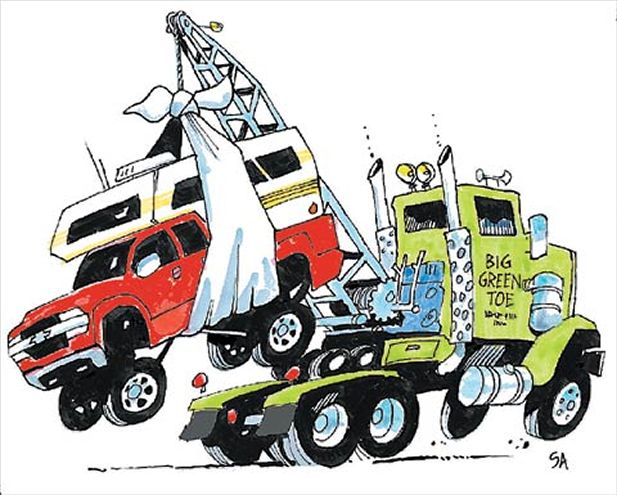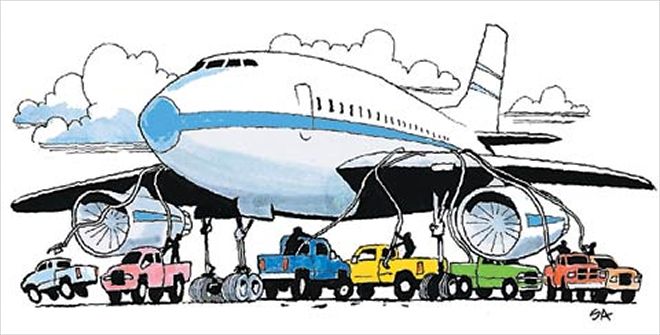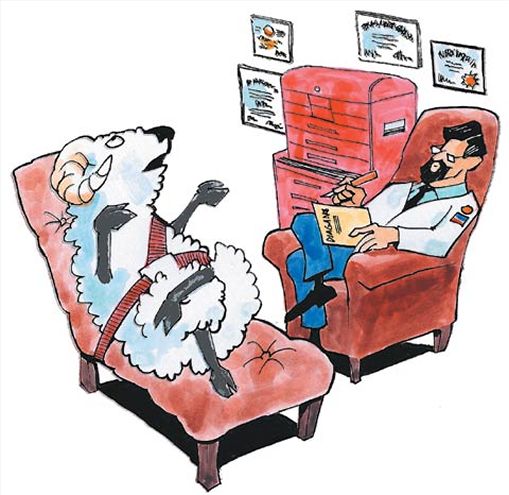Synthetic Lubes Q: I have an '02 F-250 PowerStroke Diesel with 7000 miles, and I'm wondering if switching to synthetic oil is a good idea with this engine. I've received literature from Amsoil, and it sounds like it's the best thing since sliced bread. I don't know if it's worth it (for reliability, endurance, performance), because of the additional costs. Currently, I use Chevron Delco oil with a Motorcraft filter.
A: Ford Motor Company has no objections to the use of synthetic motor oil in the PowerStroke Diesel, and it won't have an effect on your warranty. As a matter of fact, Motorcraft produces a full synthetic motor oil. A major factor in the decision should be the future plans for the vehicle. If you don't typically keep a truck more than 10 years or so, and you're located in a moderate climate, synthetic motor oil and the additional expense may not make a lot of sense. You'll get plenty of miles out of a PowerStroke Diesel with the use of conventional oil as long as you stick to the manufacturer's suggested maintenance schedule. Some synthetic-oil manufacturers advertise how much further you can go between oil changes with the use of their product. This can steer you in the wrong direction. Synthetic motor oil maintains its viscosity under extreme temperatures, has superior lubrication properties, and will not sludge as easily as conventional, but it still gets dirty and should be changed just as often. There are also synthetic/conventional blends that give you a halfway option to reduce the expense along with the benefits of a full synthetic. It's a personal preference, but there's no significant need outside of high-performance applications, extreme climate, and industrial conditions, or if it's a vehicle that should get nothing but the best due to economical or emotional ties.

| 163 0304 Ttg Confz
Tower or Towee Q: I'm confused about how to tow an '02 Silverado 3500 4x4. The owner's manual is not clear. It says dolly towing is out, and the wording for 4x4 dinghy towing is even more unclear. The service director at my Chevy dealer says "flatbed only." This would be okay except that we carry a slide-in truck camper and the total height of the Silverado, truck camper, and flatbed tow truck will be about 15 feet and might cause problems with overpasses, power lines, and tree branches. Can you help sort this out for me? Is there a way to tow other than a flatbed?
A: Towing a 1-ton truck isn't a common question, but it does apply to a lot of other vehicles. For those unfamiliar with the terminology, "dinghy towing" means all four wheels on the ground; "dolly towing" is with two wheels on the ground and the other two up on a wheeled device known as a dolly. Two-wheel-drive vehicles should not be towed using either method. The transmission is not designed to provide lubrication while being towed, but only while the engine is running and driving the transmission. Therefore, 2x4s should be towed with all four wheels off the ground on a flatbed. However, 4x4 vehicles can be towed by use of the dinghy or dolly method. Your Chevy owner's manual does permit towing a 4x4 as long as the transfer case is placed in the neutral position (consult your owner's manual for the appropriate neutral- engagement procedure). This will disengage the transmission from the driveshaft and eliminate potential damage from lack of lubrication. A way to eliminate any concern, and tow as you will with two- or four-wheel drive, is to disconnect the driveshaft at the front and/or rear axle and secure it to the chassis while being sure to use the proper towing equipment and not to exceed any of the towing-vehicle's limitations.
Airbag On or Off? Q: I've waited for the new 2500 Ram Pickup to come out and found the wait unnecessary. Do you know why Dodge will not offer an airbag-off switch in the new extended cab? Now I have to do one of two things: tell my three-year-old he has to sit in the back seat by himself or buy a Chevy.
A: It's time to step back and look at priorities. What's most important? The view from the front seat or your child's safety? There's no question as to where the little guy should ride: in an approved child seat properly anchored to the rear seat of the vehicle. Airbag deployment can be harmful to children, but regardless of the supplemental restraint system, the back seat is the safest place to be during a collision. Manufacturers supply the passenger airbag on/off switch on regular- and extended-cab trucks because of a lack of sufficient room in the back to install a rear-facing child seat; however, the Quad Cab still provides enough space in the rear for a child seat just like the Chevy Crew Cab, which also eliminates the restraint-system-disable option. Cars and trucks in '04 and '05 will have sensors in the seats to determine if the airbag is on or off. The National Highway Traffic Safety Administration has decided to leave the decision to the owner and permit the installation of an on/off switch to disable any airbag on any vehicle. So, if you want to buy a new Ram 2500 Quad Cab and insist on keeping your child in the front seat, give NHTSA a call (888/327-4236; www.nhtsa.dot.gov). You can obtain information on the necessary approval form and authorized installation facilities of the appropriate aftermarket airbag on/off switch kit.

| 163 0304 Ttg Jetz
Jet-Fuel for Pickups Q: I recently bought my first diesel truck, an '02 F-250. I also work as an aircraft mechanic. Several of the guys at work have told me that it's okay to run jet fuel in my truck. Others have said that I'm asking for trouble if I do. We often defuel jets to work on the fuel systems, and we have to drain the tanks before we can start work. The fuel is not contaminated but would otherwise be thrown away. In fact, my boss says it would save them the disposal cost. Sounds like a win-win situation, but I certainly don't want to damage my new dream truck. I have always been told that jet fuel is just more refined and offers better mileage.
A: Jet fuel is a more highly refined form of diesel with lower sulfur content and therefore minimal lubrication properties. The military uses multipurpose fuel in both jet aircraft and diesel land vehicles by means of a lubrication additive. Many airlines also utilize jet fuel with an additive in their diesel ground equipment due to the cost effectiveness. Without the additional lubrication, jet fuel might promote premature wear in various fuel-system components, such as the fuel pump and injectors along with causing drivability concerns. CTG (Chemical Technology Group; 716/683-0788 www.ctgchemicals.com) produces a fuel lubricity additive for use in commercial applications. However, we have to keep in mind this has not been tested for typical highway use, and a risk factor involving hard part damage and excessive emissions output may remain an issue. CTG sells in volume, starting with a case of 12 32-ounce bottles for $149.50 that will treat 3600 gallons of jet fuel, but it will make an exception and provide you with two bottles for $33.60 that should cover about 600 gallons. The choice is yours, but I'd play it safe and avoid the possibility of repairs that may not be covered under the manufacturer's warranty if improper fuel use is proven to be the cause.

| 163 0304 Ttg Diagz
Diagnosing a Hunting Ram Q: I own a '96 Dodge Ram pickup with the 5.2-liter V-8 and automatic transmission. Current mileage is 75,000. The problem is that the engine idles rough and then sometimes begins to hunt. When the engine is hunting, the rpms bounce up and down between 550 to 750 on the tachometer to the point that you can feel it in the truck. When the engine is hunting, and the truck's gear shifter is in park, the truck will go to 1000 rpm and stay there. So far, I've replaced the distributor cap and rotor, the spark plugs and ignition wires, PCV valve, the air-intake assembly with filter, and had the fuel injectors professionally cleaned. I even checked and replaced the worn-out and damaged vacuum hoses. I also tried to find out what's wrong by checking the truck's computer for diagnostic troubleshooting codes, but nothing abnormal was found.
A: The idle speed is controlled by the idle air control motor mounted to the throttle-body assembly on top of the intake manifold. There are numerous conditions that can affect idle-speed stability and can be detected by a qualified technician with the appropriate scan tool. There may be incorrect data that can lead to a diagnosis even though no trouble codes have been stored in the powertrain-control-module memory. Items varying from inaccurate throttle-position-sensor data to an engine-vacuum leak are possible causes. The first thing to eliminate is a common failure on the 5.2-liter V-8 and other Dodge engines that involves an internal vacuum leak at the intake-manifold plenum gasket. Since you've come up empty on previous attempts at a repair, I suggest investing in some diagnostic time at your local Dodge service department.
GM Piston-Knock Update We've finally gotten an answer on the cold-start piston knock involving 4.8, 5.3, and 6.0-liter V-8s in '99 to '02 GM cars and trucks. General Motors has previously released a Technical Service Bulletin explaining the condition that occurs after approximately 12,000 miles and a normal accumulation of carbon above the top piston ring. I spoke with Sam Winegarden, GM program manager and chief engineer for small- and big-block engines. Sam explains that following extensive testing, General Motors is confident the start-up noise will have no adverse effect on performance or durability of the engines involved. As opposed to the larger pistons of earlier design engines, today's technical refinement requires the use of smaller pistons to reduce weight and reciprocating mass in order to aid in efficiency and durability. This reduction in size also reduces the stability of the piston in the cylinder bore, which can promote piston noise. Preliminary testing on these engines showed no sign of a problem, but, as in many other situations, the symptoms came to the surface after the vehicles were subject to normal-driving conditions. The manufacturer's stand on the issue is that it doesn't warrant a service bulletin or recall promoting a repair. We were also assured the problem has been corrected on the '03-model line with a piston-design modification along with the addition of a polymer coating.
My response was from the viewpoint of a consumer who purchased a brand- new vehicle that developed a notable engine knock before the first major service. The complaint was not only about the annoyance of the condition, but also the effect on resale and depreciation. The answer was that General Motors would be dealing with the consumer on a case-by-case basis, and complaints have been resolved by means of warranty extension and parts replacement. The owners of involved vehicles exhibiting the cold-start piston knock should have the service manager of the GM dealership, which has been evaluating the noise, contact the manufacturer's zone representative. Hopefully, you can come to satisfactory terms.
 | 163 0304 Ttg Confz
Tower or Towee
| 163 0304 Ttg Confz
Tower or Towee | 163 0304 Ttg Jetz
Jet-Fuel for Pickups
| 163 0304 Ttg Jetz
Jet-Fuel for Pickups | 163 0304 Ttg Diagz
Diagnosing a Hunting Ram
| 163 0304 Ttg Diagz
Diagnosing a Hunting Ram